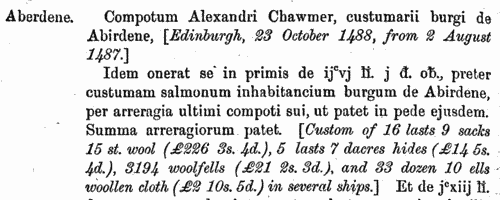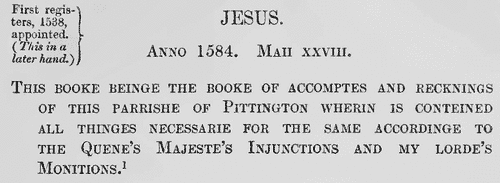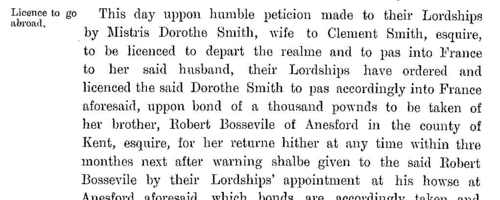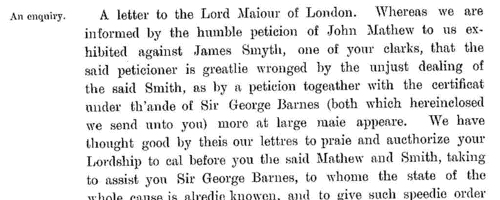Blythman Surname Ancestry ResultsOur indexes 1000-1999 include entries for the spelling 'blythman'. In the period you have requested, we have the following 49 records (displaying 1 to 10): Single Surname Subscription | | | Buying all 49 results of this search individually would cost £242.00. But you can have free access to all 49 records for a year, to view, to save and print, for £100. Save £142.00. More... |
These sample scans are from the original record. You will get scans of the full pages or articles where the surname you searched for has been found. Your web browser may prevent the sample windows from opening; in this case please change your browser settings to allow pop-up windows from this site. Officers and tenants of the Scottish crown
(1488-1496)
In 1887 the 10th volume of Rotuli Scaccarii Regum Scotorum, or The Exchequer Rolls of Scotland, was published in Edinburgh as part of the Scottish Series of Chronicles and Memorials. The main text is a transcript in extended Latin, but with some passages reduced to an abstract in English (in italics), of the rolls of the Scottish royal exchequer from 19 June 1488 to 12 October 1496 (rolls cclxxviii to ccxcv, old numbers ccxciii to cccix). This more or less continuous series alternates between accounts of the Ballivi ad Extra (royal chamberlains, lessees of lordships, rangers of wards, receivers &c) and those of the Custumars (receivers of customary payments and similar revenues) and bailies (bailiffs) of burghs (boroughs). In all, they give a summary description of all these sources of royal revenue - and not only mention the payers and receivers in general, but also refer to many occasional payments to and receipts from individuals hardly otherwise found in the surviving records. An appendix (pages 629 to 763) of rentals of royal property throughout Scotland in the same period gives a rich harvest of personal names; and another (764-772), an Index in Libros Responsionum, lists persons to whom sasine (seisin) was granted in 1492 to 1496.BLYTHMAN. Cost: £4.00.  | Sample scan, click to enlarge

| Tenants, founders and incumbents of Yorkshire chantries
(1546-1548)
Chantries were established to perform services for the souls of their founders and other faithful dead, including annual obits and anniversaries at which alms were usually distributed. The chantries could be at an existing altar in a parish church, a new altar in a side chapel of an existing church, in a new chapel in the churchyard or some miles from an existing church: few were founded before 1300, and most date from 1450 to 1500. Hospitals were places provided by similar foundations to receive the poor and weak; there were also religious guilds, brotherhoods and fraternities, and colleges (like large chantries at which three or more secular priests lived in common). An Act of Parliament of 1545 gave king Henry VIII the power to dissolve such chantries, chapels, &c., the proceeds to be devoted to the expenses of the wars in France and Scotland. Commissioners were appointed 14 February 1546 to survey the chantries and seize their property, and from 1546 to 1548 the commissioners produced these certificates giving brief details of the establishment and nature of each foundation, with an inventory of valuables and rental of lands. The individuals named in the certificates are thus the founder, the present incumbent, and the tenants whose rents provided the chantry's income. All the surviving certificates were edited by William Page for the Surtees Society, and published from 1892.BLYTHMAN. Cost: £6.00.  | Sample scan, click to enlarge

| Tradesmen of York
(1272-1558)
No man or woman could trade in the city of York without having obtained 'freedom' of the city.Their names were recorded on the 'Freemen's Roll', or Register of the Freemen of the City of York, which contains about 19,900 names for this period. A list of names was prepared for each year, the year being here reckoned as starting at Michaelmas (29 September) until 1373, and thence at Candlemas (2 February). Each annual list starts with the name of the mayor and the camerarii or chamberlains. The chamberlains were freemen charged with the duty of receiving the fees of the new freemen; of seeing that only freemen traded in the city; and of preparing this roll, which was compiled from the names on their own account books from the receipts for the fees. There are three groups of freemen: those who obtained freedom after serving out an apprenticeship to a freeman; the children of freemen; and those who claimed freedom by 'redemption', i. e. by purchase or gift from the Mayor and Court of Aldermen.
BLYTHMAN. Cost: £2.00.  | Sample scan, click to enlarge

| Scottish litigants, rebels and cautioners
(1569-1578)
The Privy Council of Scotland exercised a superior judicial authority in the kingdom, and consequently received and dealt with a constant stream of petitions, as well as dealing with the internal security of the state. This register of the council from July 1569 to June 1578, in the reign of king James VI, was edited by John Hill Burton, Historiographer Royal for Scotland, and published under the direction of the Lord Clerk Register of Scotland in 1878. Some of the individuals mentioned are the complainants, those of whom they complained, and the sureties on both sides: at this period, some of the complainants are alleging serious attacks, often of a feuding nature. Many of the bonds entered into by the cautioners are promises to keep the peace towards such enemies. Failure to answer to the council when summoned was a serious contempt, leading to being denounced a rebel, with serious consequences. But 'horning' was also used in the pursuit of debts: there was no imprisonment for debt in Scotland, but a creditor could have an obstinate debtor ordered, in the sovereign's name, to pay what was due, failing which, the debtor could be put to the horn, denounced as a rebel, and imprisoned as a rebel.
BLYTHMAN. Cost: £4.00.  | Sample scan, click to enlarge

| Scottish litigants, rebels and cautioners: excluded names
(1569-1578)
The Privy Council of Scotland exercised a superior judicial authority in the kingdom, and consequently received and dealt with a constant stream of petitions, as well as dealing with the internal security of the state. This register of the council from July 1569 to June 1578, in the reign of king James VI, was edited by John Hill Burton, Historiographer Royal for Scotland, and published under the direction of the Lord Clerk Register of Scotland in 1878. Some of the individuals mentioned are the complainants, those of whom they complained, and the sureties on both sides: at this period, some of the complainants are alleging serious attacks, often of a feuding nature. Many of the bonds entered into by the cautioners are promises to keep the peace towards such enemies. Failure to answer to the council when summoned was a serious contempt, leading to being denounced a rebel, with serious consequences. But 'horning' was also used in the pursuit of debts: there was no imprisonment for debt in Scotland, but a creditor could have an obstinate debtor ordered, in the sovereign's name, to pay what was due, failing which, the debtor could be put to the horn, denounced as a rebel, and imprisoned as a rebel. In his preface to the first volume, Burton remarked that "There might perhaps be objections to the abundance of names of persons and places unknown to fame; but it was considered that in such a work the proper names of all persons and places occurring in the Register should be preserved, to be at the service of genealogical as well as historical investigators". But by this, second, volume, he decided that complete coverage was impractical, with "the crowding in of proper names, all but a few being the names of obscure persons ... Borderers are called up in considerable groups, and ordered to find, or recorded as having found, sureties for giving compensation to persons plundered, or for good conduct for the future. Several burgesses are sometimes entered in a minute about a Corporation quarrel. When the particulars of unimportant private litigations are omitted, the names remain." He therefore devised this 'Index of Names excluded from the Text', giving name, conditions, and date in register.
BLYTHMAN. Cost: £4.00.  | Sample scan, click to enlarge

| Yorkshire Feet of Fines
(1571-1584)
Pedes Finium - law suits, or pretended suits, putting on record the ownership of land in YorkshireBLYTHMAN. Cost: £4.00.  | Sample scan, click to enlarge

| Inhabitants of Pittington, county Durham (1586)
'The booke of accomptes and recknings of this parrishe of Pittington wherin is conteined all thinges necessarie for the same accordinge to the Quene's Majestie's Injunctions and my lorde[ the bishop of Durham]'s Monitions.' Refers mostly to parishioners, but occasionally to outsiders on parish business.
BLYTHMAN. Cost: £8.00.  | Sample scan, click to enlarge

| Liegemen and Traitors, Pirates and Spies
(1590)
The Privy Council of queen Elizabeth was responsible for internal security in England and Wales, and dealt with all manner of special and urgent matters
BLYTHMAN. Cost: £4.00.  | Sample scan, click to enlarge

| Liegemen and Traitors, Pirates and Spies
(1590-1591)
The Privy Council of queen Elizabeth was responsible for internal security in England and Wales, and dealt with all manner of special and urgent matters. 1 October 1590 to 24 March 1591.
BLYTHMAN. Cost: £4.00.  | Sample scan, click to enlarge

| Wills proved at York: Names of Testators
(1627-1637)
The diocese of York comprised most of Yorkshire, and Nottinghamshire: the York Exchequer court was the ordinary probate jurisdiction for the Yorkshire part of the diocese, but some wills from Nottinghamshire and other parts of the province of York were also proved there. Dr Francis Collins compiled this index to the transcribed wills of the Prerogative and Exchequer Courts in the York registry proved from 1627 to 1637. The date on the left is that of probate; the testator's full name is then given (surname first), parish or place of abode, and sometimes occupation, and date that the will was executed; and volume and folio number where it the transcript commences. The Act Books were used by Dr Collins to supply deficiencies in the information from the transcripts.BLYTHMAN. Cost: £2.00.  | Sample scan, click to enlarge

|
Research your ancestry, family history, genealogy and one-name study by direct access to original records and archives indexed by surname.
|












